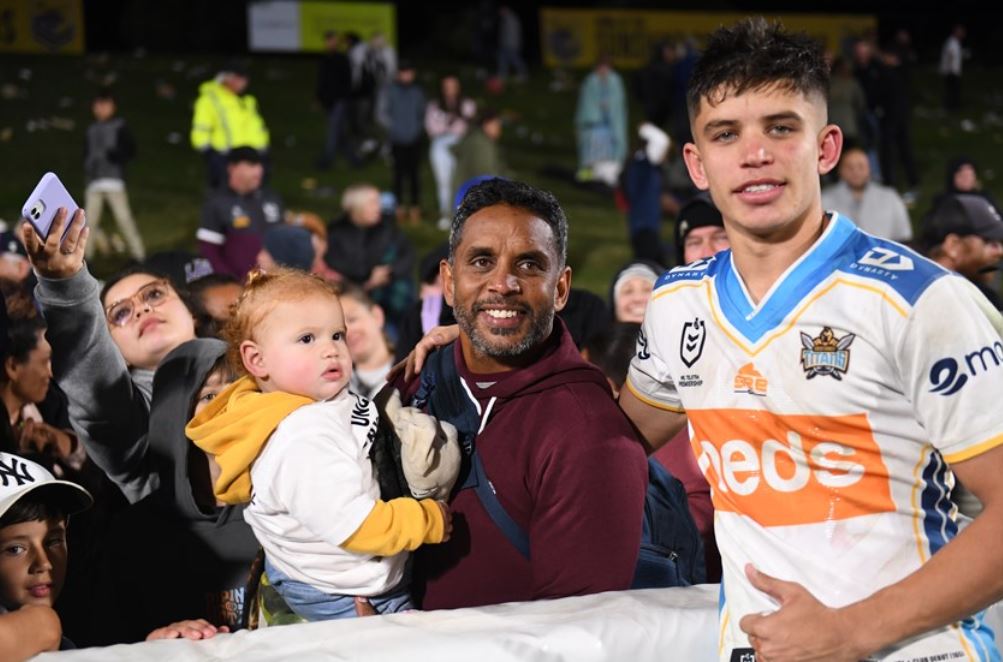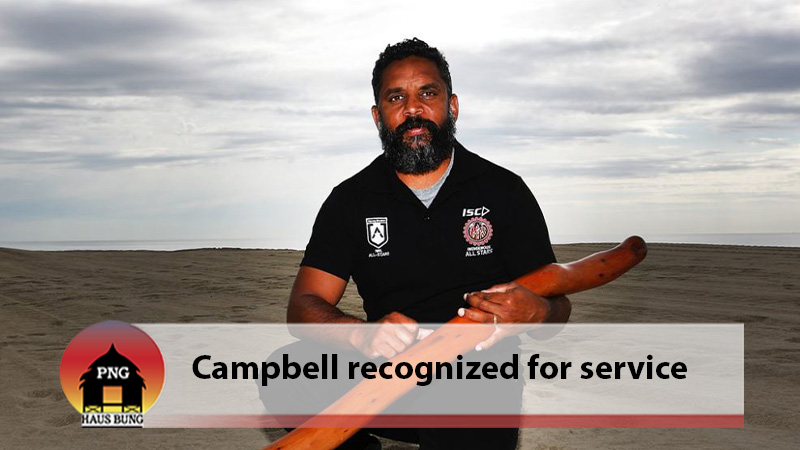Preston Campbell has been hailed as a unifying voice for Indigenous and non-Indigenous Australians, an inspiration for players to make a difference off the field and a trailblazer on it after being awarded the Medal of the Order of Australia.
Campbell, who was the driving force behind the All Stars concept in 2010, was recognised in the 2023 Australia Day honours with an OAM for service to Indigenous youth and rugby league.
The 2001 Dally M Medallist and 2003 premiership winner overcame concerns about his size from some within the game, while working tirelessly in the community since his playing days with Cronulla, Penrith and Gold Coast.
“I don’t think people realise that his whole life – seven days a week – is dedicated to young people in communities, and how much he actually gives of himself to make even the littlest difference in someone’s day, so it is awesome to see that he has got this recognition,” Australian Rugby League Indigenous Council chair Katrina Fanning said.
Campbell, who was the first player signed by the Titans when they joined the NRL in 2007, convinced officials to back the introduction of an Indigenous All Stars team after witnessing first-hand the reaction to the Aboriginal Dreamtime team which played before the 2008 World Cup opener.

The annual fixture has been a vehicle to promote education and health to Indigenous youth while educating the broader community about issues confronting First Nations people.
Many of those issues are now at the centre of discussions about an Indigenous Voice to Parliament.
“Preston has always been a unifying voice,” said Dean Widders, the NRL Indigenous pathways manager, Eels NRLW coach and man responsible for the creation of the Unity Dance performed by the Indigenous All Stars.
“You have other people who will be more confrontational and combative about issues with strong opinions and fiery, aggressive tones but he has always been the voice that brings everyone together and that is how he has been able to do a lot of his work.
“That is what All Stars was about. He set it up to bring people together – not us against them. It was not about our culture to be showcased; it was about our culture to be shared. That is an important message as we keep progressing All Stars.”
“The Indigenous All Stars is his baby and since that started there are a lot of boys that are finding out about their family history and their culture – myself included,” said Thurston, whose academy provides employment initiatives and community programs across Australia.
That was a really big moment in my life. If the All Stars wasn’t around I wouldn’t be able to do what I have ended up doing.
“I know there are other players who have been able to do that too so he has been a huge role model for not only our nation’s youth but also the players at the highest level now because of what he has been able to achieve and give back to the game.”
After retiring in 2011, Campbell founded the Preston Campbell Foundation, which operates Presto’s Training Café at Dreamworld to help school leavers gain experience and qualifications in hospitality.
“He has definitely influenced me to take on this road with what he does so I am glad he has received this recognition because it is thoroughly deserved,” said Inglis, who has established the Goanna Academy to help end the stigma about mental health.
“What he has taught me through footy and what I am doing now have been exactly the same.
“He has had his own issues [with mental health] and he wasn’t shy to speak about it. He said, ‘just be honest with yourself’ and that is what I have been doing.
“There are no secrets about me when I go out and talk about my struggles. It’s out there and he just really taught me, ‘don’t hide anything’ if you are going to do community work. If you stay true to yourself, the better it is going to be in the long run.”
Both Fanning and Widders used anecdotes to explain the impact Campbell has in the community and across the game.

“There’s not too many players who still pull a crowd like he does so many years after playing,” said Fanning, who was awarded an Officer in the General Division of the Order of Australia (AO) for distinguished service to the Indigenous community through education, health initiatives, and to sport.
“With All Stars, his emphasis has been on making sure the week and other activities across the year are more meaningful than just the game, and those things started to teach people outside of Indigenous communities.
“Over time, they have learned more that have enabled other things [like the Voice to Parliament] to gain momentum.
“He is just able to bring people along and they feel comfortable, especially on issues that many people – because of their discomfort – usually shy away from.”
Widders said wherever he went with Campbell, people wanted to talk with him and he always made time for them.
‘When I played Country with him at Dubbo I got up in the morning and he was sitting outside the hotel on the street with a group of people around him talking. He was having a coffee and he spoke with them for about 45 minutes.
“After the people left I said, ‘who is that bra, your family?’. He said, ‘I don’t know, I’m not sure who they are. They were just driving past, and they pulled over and wanted to have a yarn’. Every day with him is the same.
“We would visit remote communities in Queensland when we were working together at the Gold Coast and when we got back Preston could remember the name of every kid that we visited.
“It just shows that he sees everyone as important. If you meet the boss of a big company, you remember his name, but Preston remembered all the kids and all the teachers that we came across. Everyone is important enough for him to treat them with respect.”
Source: NRL.Com

